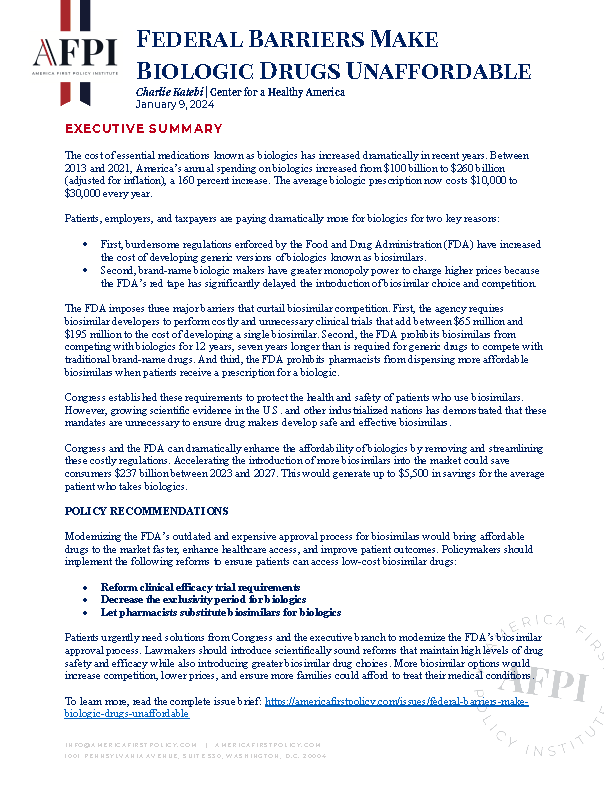Executive Summary: Federal Barriers Make Biologic Drugs Unaffordable
Executive summary
The cost of essential medications known as biologics has increased dramatically in recent years. Between 2013 and 2021, America’s annual spending on biologics increased from $100 billion to $260 billion (adjusted for inflation), a 160 percent increase. The average biologic prescription now costs $10,000 to $30,000 every year.
Patients, employers, and taxpayers are paying dramatically more for biologics for two key reasons:
- First, burdensome regulations enforced by the Food and Drug Administration (FDA) have increased the cost of developing generic versions of biologics known as biosimilars.
- Second, brand-name biologic makers have greater monopoly power to charge higher prices because the FDA’s red tape has significantly delayed the introduction of biosimilar choice and competition.
The FDA imposes three major barriers that curtail biosimilar competition. First, the agency requires biosimilar developers to perform costly and unnecessary clinical trials that add between $65 million and $195 million to the cost of developing a single biosimilar. Second, the FDA prohibits biosimilars from competing with biologics for 12 years, seven years longer than is required for generic drugs to compete with traditional brand-name drugs. And third, the FDA prohibits pharmacists from dispensing more affordable biosimilars when patients receive a prescription for a biologic.
Congress established these requirements to protect the health and safety of patients who use biosimilars. However, growing scientific evidence in the U.S. and other industrialized nations has demonstrated that these mandates are unnecessary to ensure drug makers develop safe and effective biosimilars.
Congress and the FDA can dramatically enhance the affordability of biologics by removing and streamlining these costly regulations. Accelerating the introduction of more biosimilars into the market could save consumers $237 billion between 2023 and 2027. This would generate up to $5,500 in savings for the average patient who takes biologics.
POLICY RECOMMENDATIONS
Modernizing the FDA’s outdated and expensive approval process for biosimilars would bring affordable drugs to the market faster, enhance healthcare access, and improve patient outcomes. Policymakers should implement the following reforms to ensure patients can access low-cost biosimilar drugs:
- Reform clinical efficacy trial requirements
- Decrease the exclusivity period for biologics
- Let pharmacists substitute biosimilars for biologics
Patients urgently need solutions from Congress and the executive branch to modernize the FDA’s biosimilar approval process. Lawmakers should introduce scientifically sound reforms that maintain high levels of drug safety and efficacy while also introducing greater biosimilar drug choices. More biosimilar options would increase competition, lower prices, and ensure more families could afford to treat their medical conditions.
To learn more, read the complete issue brief: https://www.americafirstpolicy.com/issues/federal-barriers-make-biologic-drugs-unaffordable
